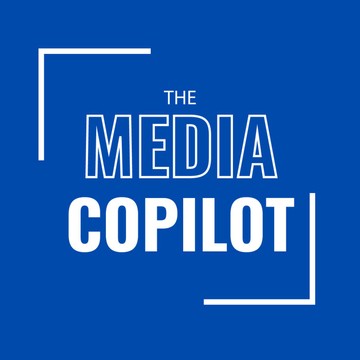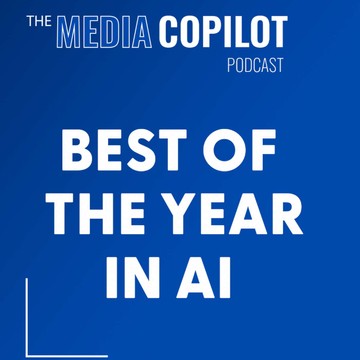

The Media Copilot
The Media Copilot
Hosted by journalist Pete Pachal, The Media Copilot is a weekly conversation with smart people on how AI is changing media, journalism, and the news.
Episodes
Mentioned books

Jan 29, 2026 • 40min
Teaching journalists to use AI without losing critical thinking
Kris Hodgson-Bright, a digital communications professor who teaches AI and immersive storytelling, discusses integrating AI into journalism teaching. He talks about using AI as a research assistant, teaching bias checks and prompt craft, building NotebookLM-style workflows, and immersive formats like 360 video and VR. He balances hopeful uses with concerns about preserving critical thinking.

13 snips
Jan 16, 2026 • 41min
Why Yahoo Still Matters and What It Knows About the Future of News
In this engaging conversation, Kat Downs Mulder, the General Manager of Yahoo News and former Washington Post editor, discusses the evolving landscape of news in an AI-driven era. She highlights Yahoo's efforts in enhancing aggregation and personalization while maintaining trust amid fragmented consumption. Kat emphasizes the significance of diverse content formats, such as audio and video, in driving audience engagement. She also explores the integration of AI's rapid advancements, balancing innovation with journalistic integrity, and the importance of user behavior in shaping news experiences.

10 snips
Dec 28, 2025 • 31min
Best of the Year: Inside the AI Shift that’s Transforming Media and Journalism
Bill Gross, Founder and CEO of ProRata, discusses how AI should financially support creators and the importance of standardizing compensation models. Annelies Jansen, Chief Business Officer at ProRata, dives into RAG-based knowledge graphs and the ethical implications of AI-generated attribution. Meanwhile, Mark Howard, COO of Time, talks about the challenges of licensing, vectorizing archives, and preparing for AI marketplaces. They explore the balance between innovation, consent, and the need for transparency in an ever-evolving digital landscape.

10 snips
Dec 19, 2025 • 43min
Can You Trust That Clip? Storyful’s James Law on Verification in the AI Era
James Law, Editor-in-Chief of Storyful, dives into the challenges newsrooms face with video verification amid the rise of AI and misinformation. He explores how verification methods evolved from the Arab Spring, emphasizing the significance of metadata in verifying sources. Law critiques the limitations of AI detection tools and the dangers of 'harmless' synthetic videos eroding trust. He advocates for authenticity and transparency in the media, offering practical tips for smaller newsrooms to build credibility in today's complex landscape.

Dec 12, 2025 • 41min
Practical AI in the Newsroom with Darla Cameron of The Texas Tribune
Darla Cameron, Chief Product Officer at The Texas Tribune, discusses her innovative approach to integrating AI in journalism. She shares surprising successes and notable failures with AI tools in reporting, emphasizing the importance of trust and careful experimentation. From analyzing podcasts to enhancing audience interaction with chatbots, Darla's insights reveal how AI can reshape newsrooms while preserving journalistic integrity. She also addresses the cautious adoption of AI-generated images and highlights the need for adaptable hiring practices to navigate this evolving landscape.

10 snips
Dec 5, 2025 • 43min
Building the Next Era of the Open Web with Adam Singolda
Adam Singolda, Founder and CEO of Taboola, shares insights on the rapid evolution of digital media. He discusses how AI is reshaping audience discovery and publisher strategies. Singolda highlights the launch of USA Today’s Deeper Dive, its impact on news consumption, and the necessity for publishers to embrace chat-based interfaces. He emphasizes the importance of building trust with audiences and experimenting with AI to stay competitive. With unique perspectives from the forefront of advertising, he outlines the challenges and opportunities for media in the open web era.

19 snips
Nov 21, 2025 • 51min
Inside Time’s AI Push: Mark Howard on Building an Agent, Not Just Another Widget
Mark Howard, Chief Operating Officer at Time, discusses the media giant's groundbreaking approach to AI. He shares how Time embraced AI as a transformative tool for journalism rather than a fleeting trend. The conversation delves into partnerships with AI companies, the creation of the Time AI Agent using its extensive archive, and innovative projects like AI-generated audio briefings. Howard emphasizes the importance of accuracy and trust in news while preparing for an AI-driven future and expanding global access to quality content.

Nov 14, 2025 • 42min
Reinventing Ads for the Age of AI
Michael Rubenstein, Co-CEO of Firsthand and veteran ad-tech executive, discusses the revolutionary concept of AI-driven brand agents. These agents engage consumers in real-time, transforming digital advertising from traditional static ads to dynamic interactions. Rubenstein highlights how brand agents prioritize opt-in privacy over cookie tracking and can adapt to various content formats. The conversation also explores the impressive engagement metrics they generate and their potential to redefine how brands communicate with audiences across multiple sectors.

8 snips
Nov 7, 2025 • 39min
How Newsrooms Are Really Using AI
John Levitt, COO and co-founder of Elvex, an AI platform for media, shares insights on the practical use of AI in newsrooms. He discusses how AI aids in reporting, fact-checking, and sales operations, emphasizing the importance of company culture for successful adoption. Levitt introduces concepts like 'context engineering' and agent-to-agent workflows, which promise personalized news experiences. He advocates for safe experimentation and highlights fast-adopting teams, focusing on how AI can transform rather than replace journalists.

Oct 24, 2025 • 47min
The Writing Renaissance: Tony Stubblebine on Medium’s Human Future in the Age of AI
Tony Stubblebine, CEO of Medium, discusses the evolving landscape of writing in an AI-influenced world. He argues that AI can enhance creativity rather than replace it, signaling a writing renaissance. The conversation touches on the shift from free-content economics to smaller writing communities, the Really Simple Licensing (RSL) standard for negotiating with AI, and the potential for AI tools to increase writers’ productivity. Stubblebine believes this era will deepen connections between writers and their audiences.


